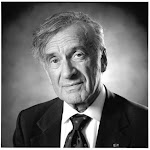The Polish icy wind was blowing fiercely and Elie's clothing quickly lost its warmth. The SS soldiers yelled over the howl of the wind, "Faster, you tramps, you flea-ridden dogs!" The pace of the group was brutal. At first Elie didn't mind, the quick pace kept him warm and the traveling was a sort of "accomplishment." Then it became unbearable. People were running, but everywhere people were falling out. Then came the shots. Orders had been given to shoot all those who lagged behind and the German soldiers did not deprive themselves of the "pleasure."
Elie was having an internal struggle while he continued on. He felt himself to be of two parts: his body and himself (his mind). He was struggling to keep up with the intense pace, so his mind just wanted to shed his heavy body. Finally his mind just screamed at him, saying, "Don't think, don't stop, run!" His foot was aching, but he had no choose but to keep going. Eventually, he describes himself as running like a sleepwalker, closing his eyes and running while asleep. That is until, someone would kick him in the back and yell at him for slowing up. Then he would just run faster and struggle through the oppressive power of sleepiness until it conquered him once more.
When the SS grew tired, they were simply replaced by new soldiers. Elie comments on the pitiful situation where no one was replacing them and more and more tired souls continued to fall out. Elie was surprised when the Kommandant announced that they had already covered twenty kilometers and it wasn't even morning yet. Now, the limits of fatigue had been surpassed, the running was only a mechanical, robotic function. The last hour of seemed like an eternity to Elie, but when the order came to halt, all he could do was collapse onto the ground with the rest of the crowd. His father didn't approve of laying in the snow, so they made their way into a near-by brick factory in ruins. Once they had gotten inside, Elie fell asleep, for an instant or an hour, he didn't know, but when his father woke him, he warned against being overtaken by the dangerous sleep.
Night had fallen and the SS began to gather the remaining inmates and form them into ranks. The dead were simply left where they were, buried in the falling snow. Elie remarked that "sons abandoned the remains of their fathers without a tear." This is a powerful statement and it goes to show how "far gone" some of the inmates were. They were delusional, uninterested in anything other than food or rest. Once marching again, Elie's wounded right foot did not hurt or ache anymore. He realized that it had probably frozen and he told himself that he would have to accept the fact that he have to live without it from now on.
As the treacherous march continued on endlessly, Elie and his fellow surviving inmates were from time to time encouraged by SS officers on motorcycles who drove along the column and shouted words of hope. Even coming from their own assassins, the marching inmates did find great help in the words and they marched on, searching the horizon for the elusive sight of the gates of Gleiwitz.
The march last several more hours and when they finally reached the camp gates, it was only when they stood right in front of them that they saw them. Once inside, the Kapos quickly divided the inmates and lead them into their barracks.
Subscribe to:
Post Comments (Atom)



.jpg)

No comments:
Post a Comment